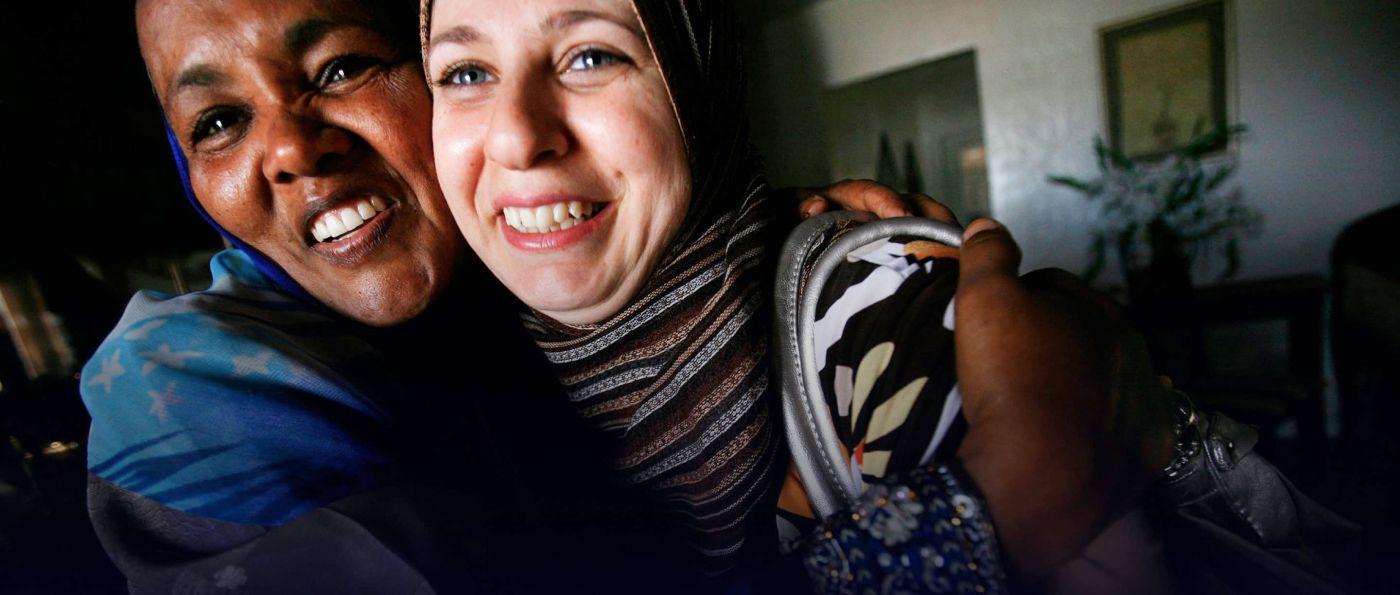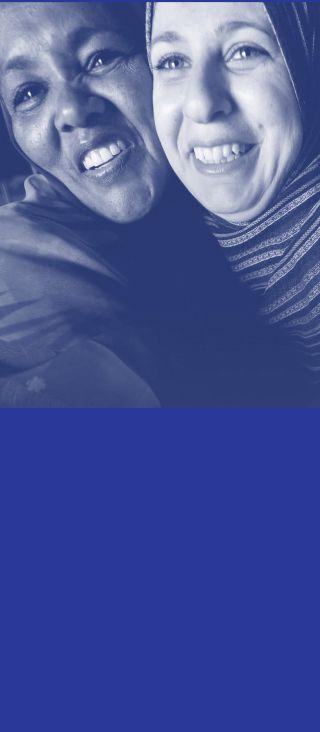

For one Navy veteran, welcoming Afghan newcomers is the truest act of patriotism
When Kabul fell to Taliban forces in August 2021, it triggered an emotional chain reaction for Matt McNally, a 22-year Navy veteran who had spent a significant part of his military career in Afghanistan. He was immediately eager to help Afghan families, but the pathways to sponsorship were limited at the time.
It wasn’t until May 2024, nearly three years later, when a chance encounter led Matt to Najia Sherzad Hoshmand, Director of Refugee Resettkement at Patchwork Indy at a local veterans' event, that things fell into place.
“When Matt and I first met, I immediately noticed his genuine care and commitment to helping Afghans. After I had explained how we are working with the Welcome Corps to help Afghan allies come to the U.S., he immediately asked, 'How do I sign up?'” Najia shared.
“It was serendipitous,” Matt said, “I went home, talked to my wife, and we signed up to sponsor a family. We didn’t know who they were yet, and we didn’t know anyone else in our sponsor group. But we just said, ‘Let’s do it.’”
Shortly after applying to sponsor a family through the Welcome Corps, a now shutdown program of USRAP that matched U.S. based sponsors with refugees around the world, they were matched with an Afghan family of five who, at the time, were living in Pakistan. By October 2024, the family was authorized to travel to the U.S., and in January 2025, the sponsors received the update that the family would arrive on Feb. 13.
Within 48 hours of getting that news, Matt and the sponsor group found out that the family would actually be arriving the next day on Jan. 18.

When the family arrived at the Indianapolis airport, the McNallys weren’t alone.
Matt shared, “I’d put out a message asking friends to come welcome them, and 30 people showed up with signs that said ‘Welcome to America,’ and ‘Welcome, Hoosiers.’”
When I hugged them, I had tears in my eyes. We walked out, and the whole crowd was clapping for them. It was amazing. A core memory.
This emotional moment was long-awaited for Afghan newcomer Rokhsar Oria and her family.

A graduate of the American University of Afghanistan, Rokhsar said she and her family lived a “happy, successful” life in Kabul before it fell to the Taliban. Her father worked in the Ministry of National Defense with American advisors, and her mother worked with the U.S. State Department, while Rokhsar worked with U.S.-affiliated organizations like USAID.
Their extensive ties to U.S. military and civil efforts placed them in direct risk after the Taliban takeover. In March 2022, after seven months of living in fear in the Taliban-controlled capital of Afghanistan, Rokhsar and her family, including her mother, father, sisters, and brothers-in-law, fled to Pakistan.
They left by car, receiving their visas at 8 p.m., and by 2 a.m., they had packed their bags and left everything they had known behind. “It wasn’t just leaving a home,” recalled Rokhsar, “It was leaving our whole life.”
When Kabul fell, it wasn’t just the country that fell. It was the fall of everything we had built. It was the fall of hope.
For nearly three years, the family lived in Pakistan under harsh conditions, “worse than you can imagine,” Rokhsar recounted. In Pakistan, refugees need to reapply for their visas on a monthly basis, and if they became undocumented, they risked deportation back to Afghanistan, where their safety would be severely threatened.
“There were financial problems, mental pressure, and constant uncertainty. Even if you had legal documents, they still found reasons to harass you. It was mental torture,” Rokhsar explained.
Despite these challenges, she never lost sight of her hope to reach safety in the U.S.
In January 2025, that hope finally materialized when they received an email notifying the family that their flights were scheduled for later that month.
“I ran all over the house. We were in shock,” she said. “Two days earlier, we lost my cousin in Virginia, and then suddenly this miracle happened.”
With little warning, their flight was moved up to Jan. 17. They departed from Pakistan to the U.S., saying goodbye to all that they had known, eager for the safety they had sought for years.
On Jan. 18, two days before the inauguration of President Trump, the family finally arrived in the U.S. Rokhsar and her family were among the last families to arrive before policy changes blocked further arrivals.
“What people tend to forget in the midst of the mass of competing news cycles is that these policy changes affect real people with real challenges. All of our other Welcome Corps families, who were yet to arrive, did not make it here after the program ended within days of the new administration taking office,” explained Bruce Garrison, Chief Executive Officer at Patchwork Indy.
It was a miracle. Ten minutes after we arrived, they banned more travel. We were the last ones.
Now living in Indianapolis, Rokhsar is prioritizing her dreams of continuing her education and searching for work opportunities. “But more than that,” she shared, “I want to help others. No matter where they’re from, what language they speak, or what religion they follow. That’s my dream. To be someone who helps people.”
She dreams of becoming an elected official, so she can be a voice for others like hers and her family’s—those pursuing their hopes and dreams in the U.S.
“This is our country now. We want to be useful citizens and great human beings who serve the people who showed us so much love and care,” she said.
Sponsor Matt McNally’s own family history is marked by those who came to the United States in pursuit of their dreams. His grandmother immigrated from Italy as a child, and has continued to pass down her story of arriving at Ellis Island in New York.
“She had dementia at the end of her life and didn’t recognize me anymore,” he said. “But when she met my wife, she told her that Ellis Island story, clear as day. That moment stuck with me. And now I get to be part of someone else’s Ellis Island story. It’s like everything came full circle.”
For Matt, refugee sponsorship is as American as it gets. “We talk about patriotism, right? But real patriotism is love of country and the people in it. If we love this country, why wouldn’t we want newcomers to love it, too, and to have a shot at building a life here? That’s the American dream, or it’s supposed to be.”
People say, ‘Do it the right way.’ But these families are doing it the right way, and still the door is being closed on them.
His passion is personal, his military career started and ended in Afghanistan, and he still carries the weight of what happened there.
“The people I worked with over there, Afghans, they cared about their country, about the future. They risked everything to work with us, and now they’re in hiding or worse. We owe it to them.”
In the six months since they arrived, Rokhsar and her family are now not only surviving, but thriving. Matt lives nearly an hour from the family, and they remain close.
“They treat me like family,” he explained, “They’re the most hospitable people I’ve ever met.”
Matt’s sponsorship journey has deepened his understanding of what it means to serve.

“There’s a false idea out there that helping refugees isn’t patriotic. That’s ridiculous. This is about building stronger communities. These newcomers are part of our future. They’ll open Afghan restaurants, raise kids in our schools, contribute to our economy. And when they tell their story in 60 years, my family will be a part of it.
“These families share values with so many Americans: faith, family, hard work. If people got to know their immigrant neighbors, a lot of these opinions would change.”
Matt said he is still not done fighting to support newcomers, “When the refugee travel ban hit in January, it lit a fire under me. I used every email contact I had, because this isn’t just about one family. It’s about whether we’re the kind of country that opens its arms or turns its back.”
He paused before adding one final thought: “If you love this country, really love it, you want to share it. You want others to have the chance to fall in love with it, too. That’s what this is all about.”
Rokhsar and her family are just one story from hundreds of thousands of newcomers who are now facing uncertain futures. The government has ended many sponsorship programs and cut access to resources like SNAP benefits and work authorization. Newcomers are unsure of what comes next, and countless others around the world are left without the possibility of seeking refuge here.
You can share your support for private sponsorship to help ensure that life-changing opportunities, like those made possible by Matt McNally and his sponsorship group, remain possible for others in need.

Welcome.US Sponsor Fund
PS: If you want to make a difference as a sponsor like Matt, learn more about our Sponsor Fund in support of our Afghan allies.
More stories of welcome


Stories of Welcome
Hoosier hospitality: How Patchwork Indy is creating a more welcoming state
December 11, 2024



